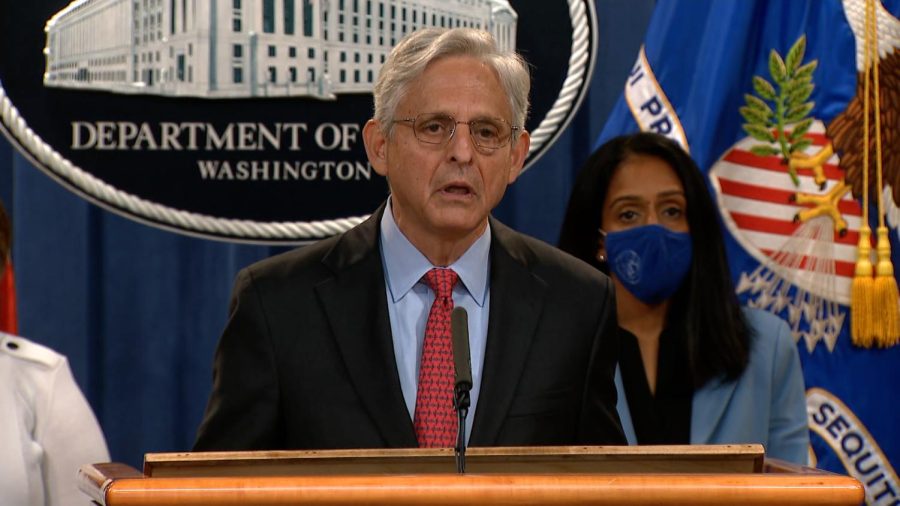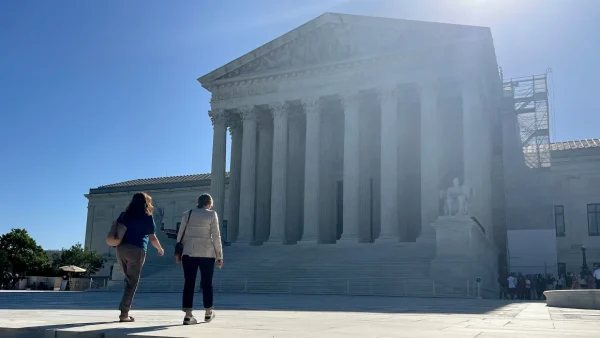The Justice Department’s uphill battle against Texas’ abortion ban
September 10, 2021
(CNN) — In its lawsuit challenging Texas six-week abortion ban, the Justice Department is throwing a Hail Mary pass to get over the procedural stumbling blocks that have thwarted other attempts to block the ban in court.
The lawsuit, filed Thursday in a federal court in Austin, relies on a novel strategy in seeking to halt enforcement of the ban, which was designed specifically with the goal of evading review of federal courts.
The arguments that the Justice Department is presenting on the merits — that the law violates Supreme Court constitutional precedent on abortion rights — are on solid ground. But the question is whether its lawsuit can get around the same procedural issues that doomed the earlier federal lawsuit brought by abortion clinics.
RELATED: Stephen Breyer calls Supreme Court decision on Texas abortion law ‘very, very, very wrong’
Here’s what to know about the lawsuit:
DOJ’s big ask: block Texas’ “agents, including private parties” from enforcing the ban
Texas has so fair foiled efforts to block the law, known as SB8, from going into effect because of how the legislature crafted the ban’s enforcement mechanism.
Instead of tasking government officials to enforce the ban — via criminal or regulatory punishments — the law deputizes private citizens to punish clinics, or anyone else who facilitates the procedure, for conducting an abortion banned by the law. They can do so by bringing private civil litigation in Texas state courts — litigation that includes the threat of at least $10,000 in damages and the potential for a court order closing the clinic.
Texas explicitly prohibited government officials from enforcing the law, depriving abortion rights advocates the normal route they have taken in past abortion cases, where they have successfully sought court orders blocking the specific government officials in charge of implementing a restrictive law.
“The obvious — and expressly acknowledged — intention of this statutory scheme is to prevent women from exercising their constitutional rights by thwarting judicial review for as long as possible,” Attorney General Merrick Garland said announcing the lawsuit Thursday. “Thus far, the law has had its intended effect.”
The Justice Department is trying to get around this in a very bold way. It’s asking for the court to block “private parties who would bring suit under S.B. 8” from enforcing the law, as the Justice Department defines those private parties as “agents” of the state.
This request is “the whole ball game,” said Steve Vladeck, a University of Texas Law School professor and a CNN Supreme Court analyst.
In making it, Justice Department to is trying to take advantage of its ability to sue the state as a whole.
When it is the US government suing a state, the state cannot bring a defense of “sovereign immunity,” which Texas can wield against private entities that try to sue a state directly for a restrictive law, rather than specific individuals. In the legal challenge to the ban that abortion clinics brought against this summer, the 2001 appeals court ruling that the state defendants have cited to argue that they cannot be sued says nothing about situations when the US government is bringing the lawsuit.
But that doesn’t make the next step in the DOJ’s arguments — that all private citizens should be treated as agents of the state for the purposes of blocking the law — any less of a reach.
“This would be unprecedented for an injunction of this scope,” said Roger Severino, who served as a top civil rights lawyer in the Department of Health and Human Services under the Trump administration.
“I’d never heard of an injunction that applies to every citizen of a state, not to mention one of the largest in the country. But that’s exactly what they asked for,” added Severino, who is now a senior fellow at the conservative think tank Ethics and Public Policy Center.
Why the US government says it has grounds to sue
The DOJ’s injunction request is its Hail Mary ask, but it’s not the only aspect of the lawsuit that puts the Biden administration on procedurally shaky ground.
Before a court even considers what to do about the law, it will have to find that United States stands to incur the kinds of harm from the ban — a threshold known as “standing” — that make it appropriate for a court to intervene in the dispute.
The department is making two separate standing arguments. One is that the Texas ban is imposing harm on the federal personnel whose duties include securing abortion access for people in the federal government’s care, because the Texas law exposes those personnel to private SB8 enforcement litigation if they help a woman obtain an abortion after six weeks.
In this vein, DOJ is also arguing that the government will incur costs from having to transport out of state individuals in its care in Texas so that they can obtain the procedure.
“The question is: is that enough harm to the United States as the United States instead of to the patients?” said David Cohen, a professor at the Drexel Kline School of Law and co-author of the book “Obstacle Course: The Everyday Struggle to Get an Abortion in America.”
Among other issues flagged, the lawsuit alleges the Texas law could interfere with the ability to perform at Defense Department facilities in Texas in the event the life of the mother is endangered or if the pregnancy is the result of rape or incest.
What is parens patriae? And why it matters
The department is making another major standing argument: that the US government has the right to bring the lawsuit against Texas because of how the ban “flagrantly infringes on the constitutional rights of the public at large.”
That standing argument relies on a legal concept known as parens patriae, Vladeck said, which espouses the government is a representative of its citizens and it can sue to vindicate the rights of those citizens.
It’s a “well-trod” legal concept, Vladeck said, but it’s on “ground that has not been trod in a while.”
The lawsuits refers multiple times to the “scheme” to “evade” the Constitution and “avoid” responsibility. The department says that Texas “has gone to unprecedented lengths to cloak its attack on constitutionally protected rights.”
This is part of why the United States says it has grounds to sue, to vindicate the rights of women and clinics that have been shut out of normal judicial process, due to the ban’s clever design.
What are the next steps?
First, a district court judge will consider the case. Currently, it’s assigned to US District Judge Robert Pitman, the same judge who has also been presided over the clinics’ challenges to the Texas law and who had signaled sympathy to their arguments, before the 5th US Circuit Court of Appeals put his proceedings on hold.
But no matter what Pittman does, the waters only get rockier for the Justice Department once the case gets to the 5th Circuit, and then the US Supreme Court.
“The 5th Circuit and the Supreme Court are not good for abortion rights, so obviously they could have very narrow procedural interpretations,” Cohen said.
As Jessie Hill, a professor and associate at Case Western University School of Law, pointed out in an email to CNN, “the ultimate arbiter of this lawsuit will be the same Supreme Court that declined to step in” when abortion clinics sought its intervention.
The Supreme Court refused to give those “plaintiffs the benefit of the doubt on the difficult procedural questions [the case] raised,” she said. “The Court may be more willing to give some deference to the DOJ, but I think it will still be an uphill battle.”
The potential for a symbolic, but not a practical, victory for the DOJ
In his speech Thursday, Garland repeatedly argued that other states might adopt Texas’ approach to get around federal review of the laws that undermine not just abortion rights, but other rights protected by the Constitution and court precedent.
Once there in court, the DOJ lawyers might put an even sharper point on that argument: if conservative judges don’t care about how the tactic has infringed upon abortion rights, will they be worried that by blue states might pass similar laws to go after gun rights?
“This kind of scheme to nullify the Constitution of the United States is one that all Americans — whatever their politics or party — should fear. If it prevails, it may become a model for action in other areas, by other states, and with respect to other constitutional rights and judicial precedents,” Garland said.
“Nor need one think long or hard to realize the damage that would be done to our society if states were allowed to implement laws that empower any private individual to infringe on another’s constitutionally protected rights in this way,” he added.
Still, if the department can’t get the blanket order it’s seeking blocking SB8’s enforcement mechanism, it is still possible that the case could end in a ruling that declares the law unconstitutional. That might not be enough for clinics to resume offering abortions after six weeks. If private citizens writ-large haven’t specifically been blocked by court order from enforcing the ban with private litigation, then abortion providers would still have to defend against those state court actions. And even if the providers will ultimately win those cases, the SB8 makes that court fight so resource-consuming, that many clinics might still be unwilling to reopen their doors.
But a declaratory judgment that said that the law was unconstitutional would still be symbolic win for the Biden administration and send a signal to other states that are contemplating mimicking Texas’ approach.
A ruling from the Supreme Court that said that Texas law was unconstitutional, but stopped short of explicitly blocking every citizen from trying to enforce it, would also give the court the opportunity to handle the case in a way that didn’t explicitly overturn Roe v. Wade. In practice, that might not make a difference to Texas clinics that would be still unable to resume the procedure and to the Texas women who, thus, would still be unable to obtain it.
The-CNN-Wire
™ & © 2021 Cable News Network, Inc., a WarnerMedia Company. All rights reserved.


























